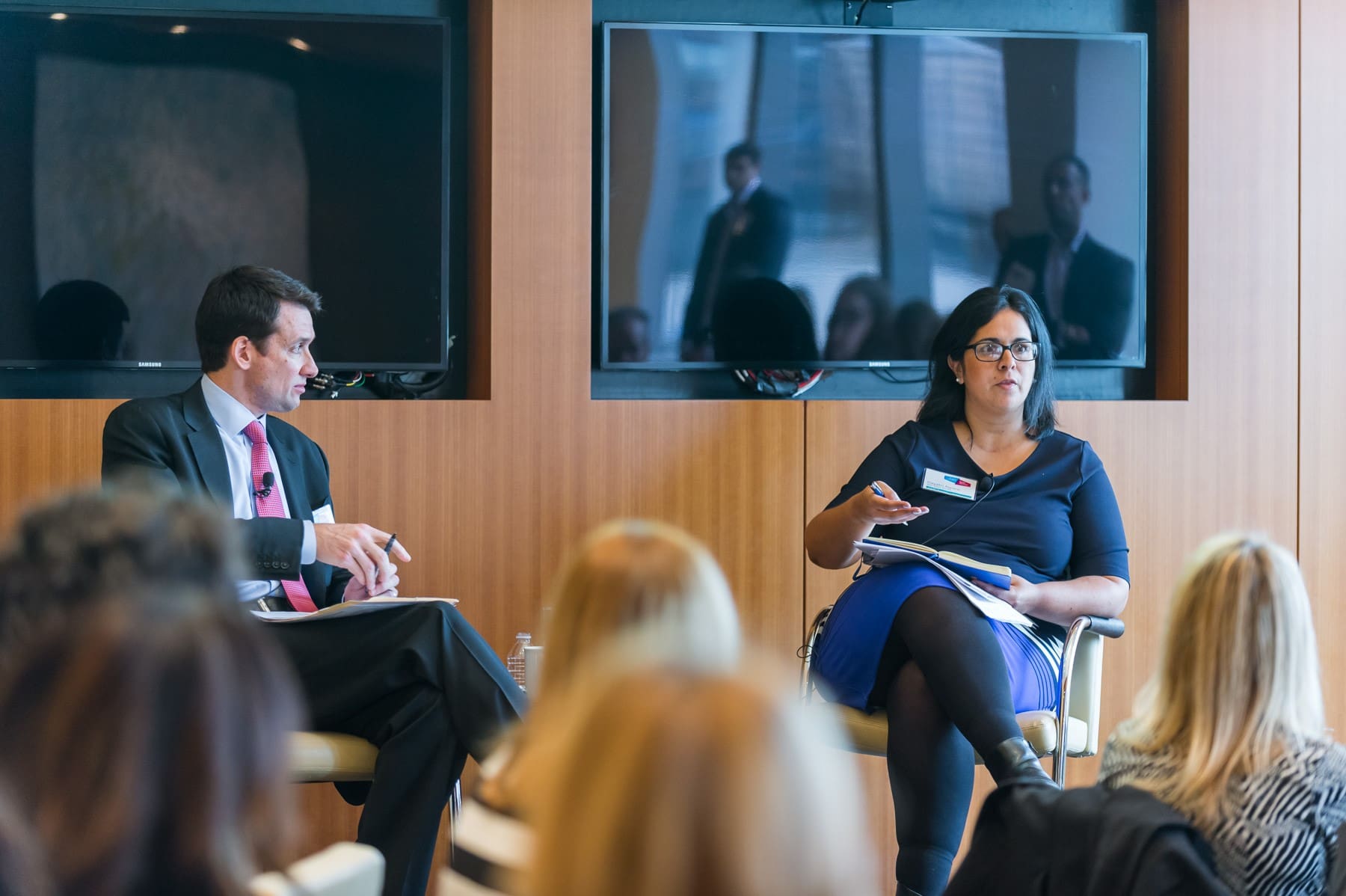“We think of ourselves as social change strategists,” explained Gayatri Agnew, Director of Career Opportunity at the Walmart Foundation, distinguishing the aspirations for her role from those typically expected of corporate foundation program officers or grants administrators.
Gayatri was speaking on CSR strategy at the 2017 CECP Summit in NYC, where we led a conversation based on Advancing Strategy: How to lead change in corporate societal engagement, recently released by FSG and CECP.
Gayatri described Walmart’s Retail Opportunity Initiative, a 5-year, $100 million effort launched in 2015 aimed at strengthening the transferability of skills of the U.S. retail workforce and developing ways to make it easier for front-line workers to advance their careers, both within and beyond Walmart. This initiative is part of a Walmart’s larger portfolio of global responsibility efforts, including other efforts focused on opportunity as well as the company’s sustainability and community priorities.
How is being a “social change strategist” different from traditional CSR leadership roles? Here are 5 lessons you can learn from Gayatri’s work. Regardless of the size of your CSR or corporate foundation portfolio, CSR executives can incorporate these lessons and seek ways to employ them in their own CSR portfolio efforts.
1) Leveraging core competencies
Why did Walmart decide to focus a significant portion of its philanthropic efforts in the area of retail opportunity? Quite simply, Walmart chose to align directly with its core competencies as a leading global retailer. With 2.3 million employees worldwide, it has decades of experience employing front-line retail employees. Gayatri and the foundation team partner directly with their HR colleagues to raise and address recruiting and retention challenges. In turn, they can integrate that internal knowledge and experience with the insights from their nonprofit partners in order to continually identify effective solutions.
2) Integrating with business strategy
In addition to leveraging its core competencies, the retail opportunity focus is squarely an integrated business strategy for Walmart—a true shared value investment to which Walmart is committed for the long term. Success at attracting, hiring, retaining, and promoting its entry-level retail employees can result in bottom-line benefits of reduced costs and improved customer service across its business. And to help build the retail sector’s capabilities in this area, Walmart has invested in codifying and disseminating a range of retailers’ best practices through support of the recent report Investing in Entry-Level Talent.
3) Employing humility and authentic listening
When you’re a large company with significant philanthropic resources, it’s easy to fall into the trap of developing prescriptive programs and asking nonprofit partners to fall into line. But Walmart took a different approach to understand the external context and needs. As Gayatri described, “You have to listen with humility. You need to talk with folks who understand the problem.” They invested time and resources to understand the true needs and gaps in the landscape of nonprofit intermediaries working on retail workforce issues and those findings informed how they designed their strategy. Despite having an extensive background in workforce development herself, Gayatri recognized the deep value of ongoing learning from perspectives of outside experts.
4) Adapting strategy as you learn
Corporate executives and foundation boards often want CSR executives to develop linear, predictive strategies and report regularly on those results. But that approach belies how innovation in social change actually unfolds. Gayatri emphasized the critical importance of having an adaptive approach. She confessed that their initial assumptions about this program were “incredibly off.” “We were stumbling through this…We guessed, we tried, we failed, and we learned from that.” And this learning is not accidental—Walmart imbeds this adaptive approach into its grantee relationships by asking grantees to report not only on programmatic indicators but also on specific learnings from the grant efforts, the insights from which can inform future strategies and programs.
5) Embracing systems change
Transforming the retail sector in the United States is clearly not a goal that any one entity, regardless of scale and resources, can tackle alone. As Gayatri described, Walmart recognizes that they are operating in the “elusive world of systems change” and that requires entirely different approaches from typical grants administration. It requires co-developing multisector efforts with partners and identifying “shared outcomes” for Walmart and its nonprofit partners. As Walmart describes in its 2017 Global Responsibility Report, “We must strive to identify and reduce system-wide barriers and to give workers the tools they need to advance within our stores, within the sector, or even in other parts of the economy.”
If you want more ideas and approaches for being a “social change strategist” in your company, read Advancing Strategy: How to lead change in corporate societal engagement >
Learn more about FSG’s corporate consulting services >

